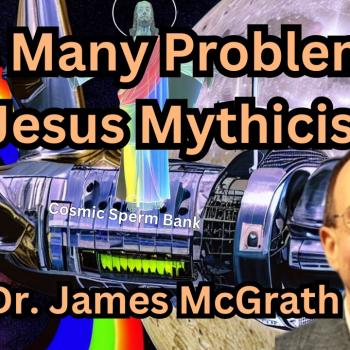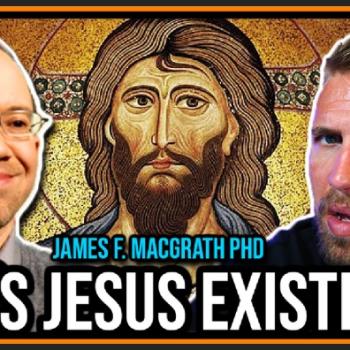Richard Carrier is quite the character, and he has written what he calls a “critical review” of Maurice Casey’s recent book about mythicism, Jesus: Evidence and Argument or Mythicist Myths?
. Anyone who is used to reading his “reviews” will know what to expect – they are typically lengthy attempts to discredit, picking at minor details which can be criticized in the hope that none of his blog readers will ever read the book and find out what the substantive points of the work are, or if they do, will be so biased against it as a result of reading his “review” first that its points will fail to persuade. If that is what you are expecting, you will not be at all surprised by what is in this one. The entire thing is a combination of insults and complaints that even though Casey has shown that mythicists get lots of things wrong, that does not prove that they are not right – the “fallacy fallacy.”
Perhaps we need to add to the list of explicitly articulated logical fallacies the “fallacy fallacy fallacy.” While it is true that showing that most or all one’s opponent’s claims and arguments are fallacious does not show them to be incorrect, it does mean that until they make a non-fallacious case, their claims are not only unworthy of being taken seriously, but incapable of being taken seriously by scholars, for whom the starting point is the articulation of a legitimate case for a conclusion. And Carrier presumably knows this, since he points out the fallacies of others – including Casey. But since in this case, Casey is defending a view that thousands of scholars have articulated at least in part, Carrier ought to have accepted that he himself has committed the “fallacy fallacy.” Even if all of Carrier’s complaints – from the opening “you suck” to the “crazy uncle” – were valid, that would not mean that the entirety of mainstream historical scholarship about Jesus is undermined. Unless – as seems to be the case – Carrier has committed the fallacy fallacy fallacy.
Carrier works hard to make the case that it was not impossible for ancient Jews to believe that someone could be descended from David, crucified, buried, and raised in the heavenly realm. Even if that is granted, no mythicist has shown that that is what most Jews thought, or that one can assume that that is what Paul meant. And if Paul’s readers cannot be shown to have assumed that that was where such things transpired in the life of Jesus, then his claim that there are no references to anything that can be understood as a reference to the life of a historical Jesus in the letters of Paul is revealed to be bogus several times over.
Several times Carrier complains that works which appeared in print subsequent to the manuscript’s completion (it has been a slow process to see it finally polished and in print due to Casey’s poor health) are not mentioned. It is almost as though Carrier does not read enough scholarly monographs to realize that such time lags between completion of writing and appearance in print are par for the course. And Carrier seems to adopt the view that, because not all mythicists do certain things, somehow Casey’s criticisms of those who do are shortcomings of the book.
The root of the problem is presumably Carrier’s exaggerated sense of self-importance and of his own insight, a problem which plagues many if not indeed all mythicists to varying degrees. He writes:
I will say there are two reasons to get and read the book: (1) I very much want you to read his book, after reading my book On the Historicity of Jesus–because historicity will be well done and dead once you see the difference between how I make a case for mythicism (and what an organized, careful, thorough work of scholarship looks like), and this bizarre quasi-fundamentalist travesty of a defense for historicity…
And then he has the audacity to claim that Casey is behaving “like an elitist child”!
Carrier makes clear throughout his “review” that he does not grasp ancient Jewish history (or for that matter anthropology) sufficiently to discuss the details with a scholar like Casey in an informed manner. For instance, he writes:
Another example of not paying attention is when Casey accuses Thompson of being incompetent because Thompson says Mark 7 is about “hygiene” when in fact it’s about purity laws (7-5869). Except that it’s obvious to anyone who actually reads the passage in question that Thompson meant spiritual hygiene, in other words, purity laws.
He also calls Casey’s arguments for the authenticity of some material a selective acceptance of Biblical inerrancy.
Right…
I will be interested to hear what other professional scholars make of Carrier’s post, especially scholars who have actually read Casey’s book, and ideally those who have read Carrier’s own scholarly publications and are thus well poised to see not only Carrier’s treatment of scholarly arguments in the manner of an apologist, but also his unjustified sense that his own work provides what everyone else is lacking.
What seems most ironic to me is that, in the very best case scenario, Carrier is doing precisely what he accuses Casey of doing, namely latching on to flaws and problems about some details and using them to try to get people to ignore substantive points unaffected by those issues. I remember when I read an early draft of Casey’s book, I too found some claims problematic and even self-defeating. But none of those changes the fact that the majority of the book is an insightful, detailed, and persuasive case for the view that remains the overwhelming consensus of historians and scholars who work in the relevant fields: that there was a historical Jesus of Nazareth.













